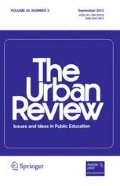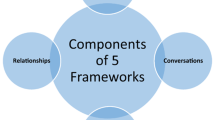Abstract
This paper analyzes how and why ten Black and Latina/o youth attending an urban public high school engage culturally relevant peer interactions (Knight and Marciano in College ready: preparing Black and Latina/o youth for higher education—a culturally relevant approach. Teachers College Press, New York, 2013) in preparing for, applying to, and/or enrolling in college. The study reconsiders culturally relevant pedagogy (Ladson-Billings in The dreamkeepers: successful teachers of African American children. Jossey-Bass, San Francisco, 1994) as an analytic tool for exploring youth’s culturally relevant peer interactions as supportive of their college-going processes (Tierney and Colyar in Preparing for college: nine elements of effective outreach. SUNY Press, Albany, 2005) and new media literacy practices (Ito et al. in Living and learning with new media: summary of findings from the Digital Youth Project. The MacArthur Foundation, Chicago, 2008. http://www.macfound.org/media/article_pdfs/DML_ETHNOG_WHITEPAPER.PDF). Research findings include: new understandings of the reciprocal nature of youth’s culturally relevant peer interactions; and new enactments of youth’s college-going new media literacy practices. Recommendations for educational policy, practice, and research supportive of students’ college readiness and access are discussed.

Similar content being viewed by others
References
Astin, A. (1993). What matters in college: Four critical years revisited. San Francisco, CA: Jossey-Bass.
Bogdan, R. C., & Biklen, S. K. (2007). Qualitative research for education: An introduction to theories and methods. Boston, MA: Pearson Education Inc.
Conley, D. T. (2012). A complete definition of college and career readiness. Eugene, Oregon: Educational Policy and Improvement Center.
DePaoli, J. L., Hornig Fox, J., Ingram, E. S., Maushard, M., Bridgeland, J. M., Balfanz, R. (2015). Building a grad nation: Progress and challenge in ending the high school dropout epidemic. Retrieved May 12, 2015, from http://gradnation.org/sites/default/files/18006_CE_BGN_Full_vFNL.pdf
Ellison, N. B., Steinfield, C., & Lampe, C. (2007). The benefits of Facebook “friends”: Social capital and college students’ use of online social network sites. Journal of Computer-Mediated Communication, 12, 1143–1168.
Farmer-Hinton, R. (2006). On becoming college prep: Examining the challenges charter school staff members face while executing a school’s mission. Teachers College Record, 108(6), 1214–1240.
Farmer-Hinton, R., & McCullough, R. G. (2008). College counseling in charter high schools: Examining the opportunities and challenges. The High School Journal, 91(4), 77–90.
Farrell, E., Peguero, G., Lindsey, R., & White, R. (1988). Giving voice to high school students: Pressure and boredom, ya know what I’m sayin’? American Educational Research Journal, 25, 489–502.
Gibson, M., Gandara, P., & Koyama, J. (Eds.). (2004). School connections: U.S. Mexican youth, peers, and school achievement. New York, NY: Teachers College Press.
Hossler, D., & Gallagher, K. (1987). Studying college student choice: A three-phase model and the implications for policy makers. College and University, 62, 207–221.
Hungerford-Kresser, H., & Amaro-Jimenez, C. (2012). Urban-schooled Latina/os, academic literacies, and identities: (Re)Conceptualizing college readiness. Perspectives on Urban Education, 9(2), 1–14.
Hurn, C. J. (1993). The limits and possibilities of schooling: An introduction to the sociology of education. Boston, MA: Allyn and Bacon.
Ito, M., Horst, H., Bittanti, M., Boyd, D., Herr-Stephenson, B., Lange, P. G. & Robinson, L. (2008). Living and learning with new media: Summary of findings from the Digital Youth Project. Reports on Digital Media and Learning. Chicago: The MacArthur Foundation. Retrieved November 9, 2012, from http://www.macfound.org/media/article_pdfs/DML_ETHNOG_WHITEPAPER.PDF
Jenkins, H., Clinton, K., Purushotma, R., Robison, A. J., & Weigel, M. (2006). Confronting the challenges of participatory culture: Media education for the 21st century. Building the Field of Digital and Learning. Chicago: The MacArthur Foundation. Retrieved October 3, 2010, from http://digitallearning.macfound.org/atf/cf/%7B7E45C7E0-A3E0-4B89-AC9CE807E1B0AE4E%7D/JENKINS_WHITE_PAPER.PDF
Knight, M. (2010). Enacting care, preparing for college and increasing access for Black youth. Journal of Students Placed at Risk, 15(2), 158–172.
Knight, M., & Marciano, J. (2013). College ready: Preparing Black and Latina/o youth for higher education—A culturally relevant approach. New York, NY: Teachers College Press.
Knight-Manuel, M., Marciano, J., Wilson, M., Jackson, I., Vernikoff, L., Zuckerman, K., et al. (2016). “It’s all possible”: Urban educators’ perspectives on creating a culturally relevant, school-wide, college-going culture for Black male students. Urban Education. doi:10.1177/0042085916651320.
Ladson-Billings, G. (1994). The dreamkeepers: Successful teachers of African American children. San Francisco, CA: Jossey-Bass.
Ladson-Billings, G. (1995). Toward a theory of culturally relevant pedagogy. American Educational Research Journal, 32(3), 419–465.
Ladson-Billings, G. (2014). Culturally relevant pedagogy 2.0: a.k.a. the remix. Harvard Educational Review, 84(1), 74–84.
Lenhart, A. (2012). Teens, smartphone, and texting. Washington, DC: Pew Research Center’s Internet and American Life Project. Retrieved March 30, 2014, from http://www.pewinternet.org/files/old-media//Files/Reports/2012/PIP_Teens_Smartphones_and_Texting.pdf
Lenhart, A., Smith, A., Anderson, M., Duggan, M. Perrin, A. (2015). Teens, technology, and friendships. Washington, DC: Pew Research Center. Retrieved November 10, 2016, from http://www.pewinternet.org/2015/08/06/teens-technology-and-friendships/
Lewis-Charp, H., Yu, H. C., & Friedlaender, D. (2004). The influence of intergroup relations on school engagement: Two cases. In M. A. Gibson, P. Gandara, & J. P. Koyama (Eds.), School connections: U.S. Mexican youth, peers, and school achievement (pp. 107–128). New York, NY: Teachers College Press.
Loza, P. (2003). A system at risk: College outreach programs and the educational neglect of underachieving Latino high school students. The Urban Review, 35(1), 43–57.
Marciano, J. (2015). Becoming Facebook friendly: Social media and the culturally relevant classroom. English Journal, 104(5), 73–78.
Marshall, C., & Rossman, G. B. (2011). Designing qualitative research. Los Angeles, CA: Sage.
McDonough, P. (1997). Choosing colleges: How social class and schools structure opportunity. Albany, NY: State University of New York Press.
Morrell, E. (2008). Six summers of YPAR: Learning, action, and change in urban education. In J. Cammarota & M. Fine (Eds.), Revolutionizing education: Youth participatory action research in motion (pp. 155–184). New York, NY: Routledge.
Oakes, J., Rogers, J., Lipton, M., & Morrell, E. (2002). The social construction of college access: Confronting the technical, cultural, and political barriers to low-income students of color. In W. G. Tierney & L. S. Hagedorn (Eds.), Increasing access to college: Extending possibilities for all students (pp. 105–121). Albany, NY: State University of New York Press.
Paris, D., & Alim, H. S. (2014). What are we seeking to sustain through culturally relevant pedagogy? A loving critique forward. Harvard Educational Review, 84(1), 85–100.
Sacks, P. (2007). Tearing down the gates: Confronting the class divide in American education. Berkeley, CA: University of California Press.
Sallee, M. W., & Tierney, W. G. (2007). The influence of peer groups on academic success. College and University, 82(2), 7–14.
Schmeichel, M. (2011). Good teaching? An examination of culturally relevant pedagogy as an equity practice. Journal of Curriculum Studies. doi:10.1080/00220272.2011.591434.
Solorzano, D. G., & Delgado Bernal, D. (2001). Examining transformational resistance through a critical race and Latcrit theory framework: Chicana and Chicano students in an urban context. Urban Education, 36(3), 308–342.
Stanton-Salazar, R. D., & Spina, S. U. (2005). Adolescent peer networks as a context for social and emotional support. Youth and Society, 36(4), 379–417.
Tierney, W. G. (2009). Applying to college. Qualitative Inquiry, 15(1), 79–95.
Tierney, W. G., & Colyar, J. E. (2005). The role of peer groups in college preparation programs. In W. G. Tierney, Z. B. Corwin, & J. E. Colyar (Eds.), Preparing for college: Nine elements of effective outreach (pp. 49–68). Albany, NY: SUNY Press.
Tierney, W. G. & Venegas, K. (2006). Fictive kin and social capital: The role of peer groups in applying and paying for college. In W. Tierney, K. Venegas, & de la Rosa (Eds.), Financial aid and access to college: The public policy challenges. American Behavioral Scientist, 49(12), 1687–1702.
Trier, J. (2005). Sordid fantasies: Reading popular inner-city school films as racialized texts with pre-service teachers. Race, Ethnicity, and Education, 8(2), 171–189.
Venegas, K. (2006). Internet inequalities: Financial aid, the internet, and low-income students. American Behavioral Scientist, 49(12), 1652–1669.
Villalpondo, O., & Solarzano, D. (2005). The role of culture in college preparation programs: A review of the research literature. In W. G. Tierney, Z. B. Corwin, & J. E. Colyar (Eds.), Preparing for college: Nine elements of effective outreach (pp. 13–28). Albany, NY: State University of New York Press.
Walker, E. (2010). Building mathematics learning communities: Improving outcomes in urban high schools. New York, NY: Teachers College Press.
Watson, V. W. M., & Marciano, J. (2015). Examining a social-participatory youth co-researcher methodology: A cross-case analysis extending possibilities of literacy and research. Literacy, 49(1), 37–44.
Watt, K., Huerta, J., & Lozana, A. (2007). A comparison study of AVID and GEAR UP 10th grade students in two high schools in the Rio Grande Valley of Texas. Journal of Education for Students Placed At Risk, 12(2), 185–212.
Wohn, D., Ellison, N., Khan, M., Fewins-Bliss, R., & Gray, R. (2013). The role of social media in shaping first generation high school students’ college aspirations: A social capital lens. Computers and Education, 63, 424–436.
Author information
Authors and Affiliations
Corresponding author
Rights and permissions
About this article
Cite this article
Marciano, J.E. “We’re Friends, We Have to be in This Together”: Examining the Role of Culturally Relevant Peer Interactions in Urban Youth’s College Readiness and Access. Urban Rev 49, 169–187 (2017). https://doi.org/10.1007/s11256-016-0387-4
Published:
Issue Date:
DOI: https://doi.org/10.1007/s11256-016-0387-4




